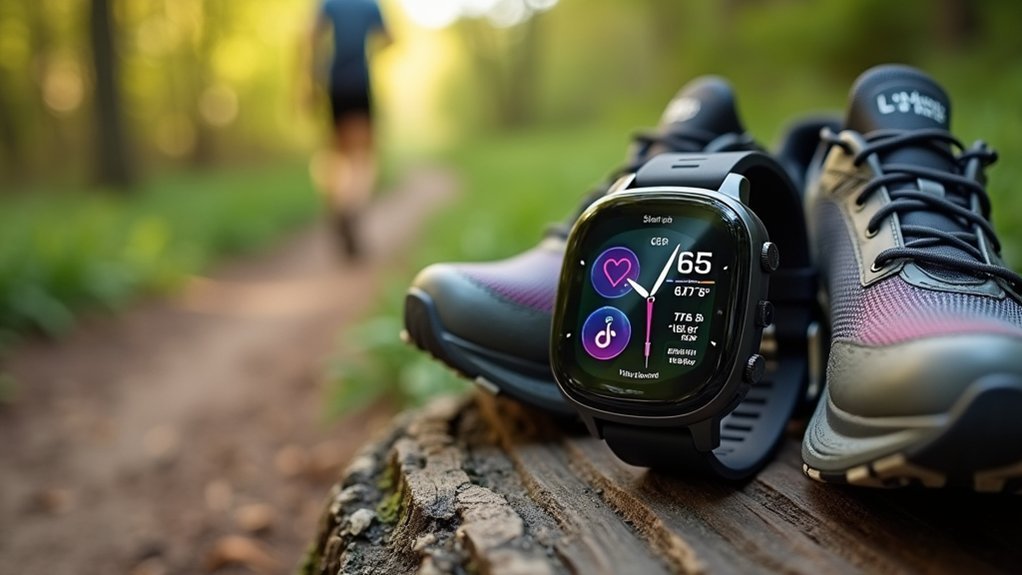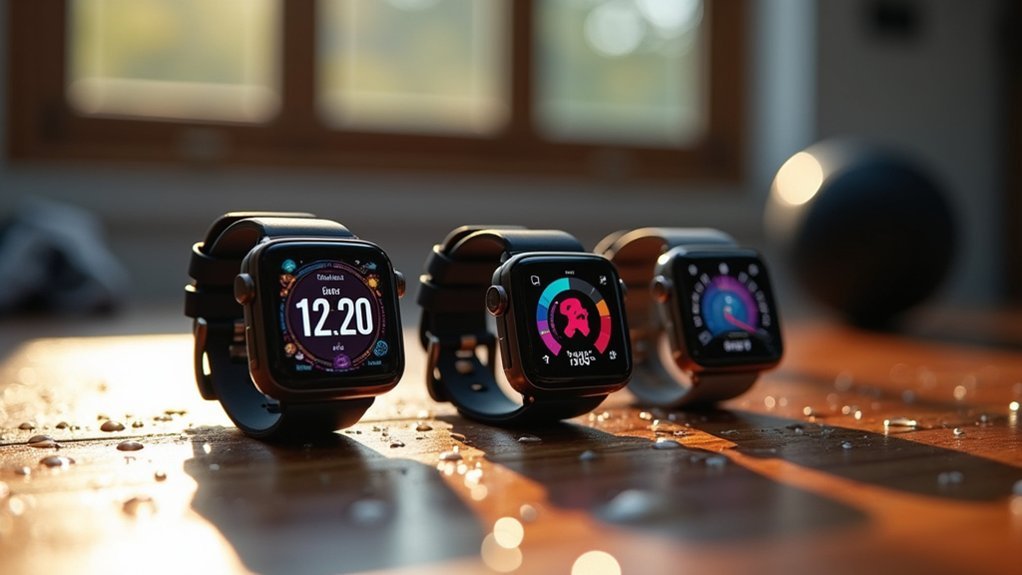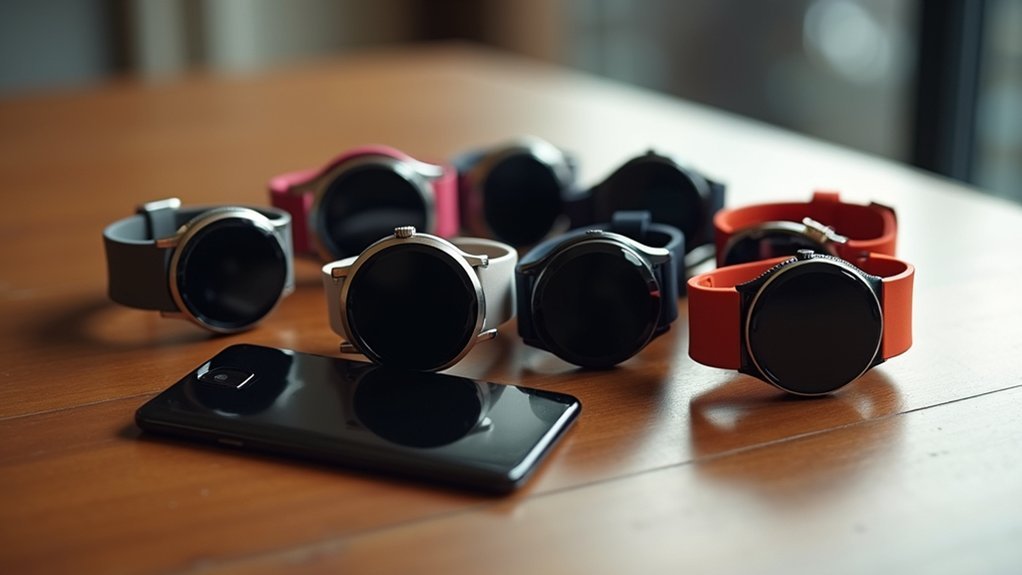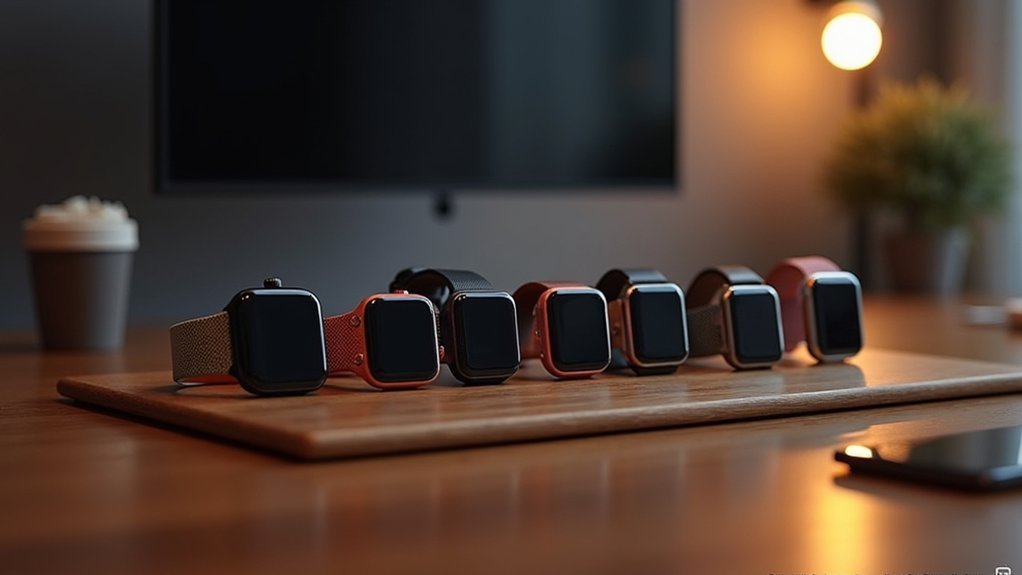For athletes seeking exceptional battery life, consider the Garmin Instinct 2 Solar with virtually unlimited battery through solar charging, the Garmin Fenix 7 Pro Solar offering durability and extended performance, or the Coros Vertix 2 with its impressive 60-day battery life. All three watches deliver reliable tracking during extended workouts while requiring minimal charging. Your training regimen deserves a device that won’t quit before you do – explore how these powerhouses can transform your athletic performance.
Why Lithium Battery Performance Is Critical for Athletic Wearables

When athletes push their physical limits during training or competition, their smartwatches must keep pace without faltering. You need devices that deliver reliable performance throughout extended workouts, races, and training sessions without requiring constant recharging.
Lithium-ion batteries, with energy densities between 100-265 Wh/kg, make this possible by packing substantial power into compact, lightweight designs. This high energy density allows manufacturers to create comfortable wearables that won’t hinder your movement or add unnecessary weight.
The consistency of lithium battery performance guarantees you’ll receive accurate, real-time data tracking throughout your entire session. This reliability transforms your training approach, enabling data-driven decisions that optimize performance gains. The dramatic 97% price decrease in lithium batteries since 1991 has made high-performance athletic wearables more accessible to athletes at all levels.
When every second counts in competition, your wearable’s battery life shouldn’t be what holds you back.
Top Lithium-Powered Smartwatches That Go the Distance
The right lithium-powered smartwatch can transform your athletic performance by delivering consistent tracking throughout even your most demanding sessions.
For unparalleled battery endurance, consider the Garmin Instinct 2 Solar with its virtually unlimited solar-powered battery life.
When durability matters alongside longevity, the Garmin Fenix 7 Pro Solar combines premium materials with solar charging capabilities.
The Forerunner 265 offers 13 days of battery life in a lightweight package perfect for runners. With its AMOLED touchscreen, this model enhances the user experience while maintaining excellent battery performance.
If you’re seeking advanced health metrics with exceptional battery performance, the Garmin Venu 3 delivers thorough health stats without frequent charging.
For Apple fans, the Ultra Watch 2 provides extended battery life with premium features, though at a higher price point than its competitors.
Battery Management Features Every Athlete Should Consider
Although many athletes focus primarily on fitness features, understanding your smartwatch’s battery management options can greatly impact your training experience.
Power-saving modes strategically limit functions like heart rate monitoring and GPS to extend battery life during longer events.
Consider disabling non-essential features such as haptic feedback and sound notifications when you need extra hours of performance.
For ultra-endurance activities, basic clock modes that track only steps and sleep can dramatically extend battery life.
Your usage patterns matter too—GPS accuracy modes offer a clear trade-off between precision and power consumption.
If you’re training for extended periods, look for watches with customizable battery profiles that match your specific needs.
During multi-day events, having backup charging options becomes essential for uninterrupted tracking of your performance metrics.
Brands like Coros provide impressive battery longevity that ensures consistent tracking during extended activities without frequent charging interruptions.
Frequently Asked Questions
How Do Extreme Temperatures Affect Lithium Battery Performance in Smartwatches?
Extreme heat dramatically reduces your smartwatch’s battery life and can cause permanent damage. Cold temperatures temporarily decrease performance. You’ll get ideal performance between 20-30°C, while temperatures above 40°C considerably stress the battery.
Can Replacing the Battery in Athletic Smartwatches Void the Warranty?
Yes, replacing your smartwatch battery yourself typically voids the warranty. Manufacturers require battery replacements to be done by authorized service centers to maintain coverage. You’ll risk both warranty protection and potential device damage through DIY attempts.
How Do Lithium Battery Smartwatches Perform During Water Sports?
Lithium battery smartwatches perform excellently during water sports with ratings up to 5 ATM. You’ll enjoy accurate GPS tracking, heart rate monitoring, and reliable performance while swimming, kayaking, or paddleboarding, though they’re not ideal for deep diving.
Are There Recycling Programs for Old Lithium-Powered Smartwatches?
Yes, you’ll find many recycling options for your old smartwatch. Retailers like Best Buy accept them in-store, while programs like Call2Recycle offer thousands of drop-off locations at Home Depot and Lowe’s.
Do Third-Party Apps Significantly Drain Battery Life on Athletic Smartwatches?
Yes, third-party apps can considerably drain your smartwatch battery. They often run background processes, use GPS tracking, and access sensors constantly. You’ll notice longer battery life if you limit or optimize these applications.
In Summary
When you’re pushing your limits, your smartwatch shouldn’t give up before you do. Choose a lithium-powered timepiece that matches your endurance needs, whether it’s the marathon-ready Battery King Pro, the versatile TrailTracker X2, or the solar-enhanced UltraCharge 5. Remember to leverage battery optimization features and training modes to maximize performance. Your perfect athletic companion is one that stays powered through your toughest challenges.





Leave a Reply